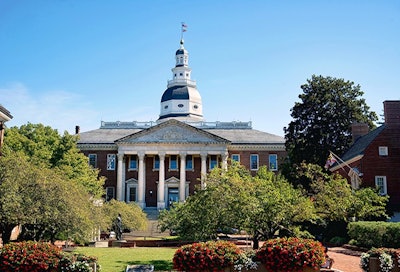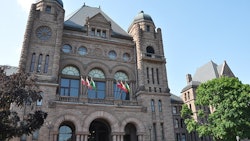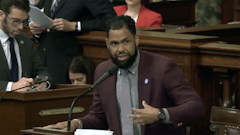
Maryland legislators are introducing bills this week to advance adult-use legalization and hoping to put the matter on the November 2018 ballot—ultimately letting Maryland voters have their say on the issue.
This morning, those bills’ co-sponsors joined Maryland cannabis advocates at the House of Delegates and presented details of a possible constitutional amendment as part of the Maryland Cannabis Policy Coalition’s “Cannabis Lobby Day.” In short, the language in that amendment “would make possession and home cultivation of limited amounts of cannabis legal for adults 21 years of age and older and require the state to establish regulations and taxation for a legal cannabis market,” according to the Maryland Cannabis Policy Coalition.
Legal possession, in this case, would allow up to one ounce of cannabis and up to five grams of concentrated cannabis. At home, adults would be allowed to grow three mature and three immature plants. If the voters were to approve the amendment, the legislature and state comptroller would be charged in 2019 with developing a tax-and-regulate market (enacting, for example, tracking, testing and labeling protocols).
The bill would also mandate certain diversity requirements for cultivation and dispensary permit holders.
The recreational-use constitutional amendment would need 60-percent support from both chambers of the legislature to move forward to the ballot. Because the legislation tees up a constitutional amendment, the governor would not be given a chance to veto the approved bill.
“Maryland voters want to regulate cannabis, but they can’t make their voices heard unless my fellow lawmakers give them the opportunity."
- Del. David Moon
According to a 2016 Washington Post-University of Maryland poll, 61 percent of Maryland voters support legalizing recreational marijuana.
This latest push for a legal adult-use market comes at a very busy time for Maryland’s fledgling cannabis industry.
Maryland’s medical marijuana law was approved by legislators and then-Gov. Martin O’Malley in 2014. It wasn’t until late 2017, however, that the first medical marijuana dispensaries opened in the state. The state market immediately ran into problems with access and steady supply streams. In recent weeks, lawmakers have been debating how to ensure more diversity among state-licensed growers (something that wasn't taken into consideration in developing the program roll-out).
The Baltimore Sun editorial board recently urged action on that last matter: “Why the commission did not at that point request such a study is a mystery, but last year, Gov. Larry Hogan ordered that one be conducted, and, despite hopes that it could be quickly concluded, it is due by the end of the month. Whatever it may find, the state has every reason to move forward with an expansion in the number of grower’s licenses and a new application procedure that uses race-conscious policies to foster diversity, if possible, and race-neutral ones if not.”
That diversity bill awaits further debate.
“Maryland voters want to regulate cannabis, but they can’t make their voices heard unless my fellow lawmakers give them the opportunity,” Del. David Moon, the primary sponsor of the House bill, said in a public statement. “Our constituents are ready for a grown-up conversation about cannabis policy. We need to focus on how to best implement the will of the people and stop allowing criminals to control the cannabis market.”
Top photo courtesy of Adobe Stock


























